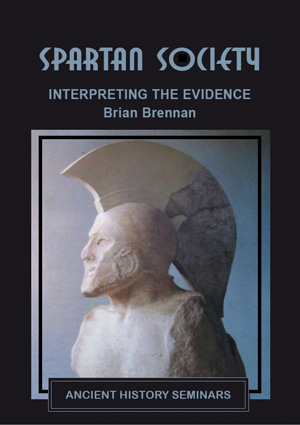
Here are some books that you may find useful during your studies. Search the Bennies catalogue Accessit or more, or browse the Non-fiction collection NFS..
 Spartan society : interpreting the evidence by
Spartan society : interpreting the evidence by Athens and Sparta, the leading city-states of ancient Greece, helped to establish many of the ideas and concepts we take for granted: citizenship; voting; and individual rights and freedoms. This program provides insight into the values of each city state by examining their attitudes toward: education, entertainment, military training, and crime and punishment. Key groups within Athenian and Spartan social structures are discussed, and the rights and responsibilities of citizens and women in each city-state are compared.
Spartiate women played important roles in their society as the bearers of children the mothers of warriors heiresses managers of estates. Helot women performed vital domestic and agricultural functions. The female voice of Sparta is not heard. So we are entirely reliant on sources written by men. Xenophon, an Athenian soldier, spent some time in Sparta in the late 5th and early 4th century B.C. Aristotle wrote in the 4th century B.C. and was highly critical of Sparta. Everyone in Spartan society including women, was expected to support the military ethos on which the society was based.
Political system based on “Great Rhetra”; Mixed constitution, Assembly, Ephorate, Dual kingship, and Gerousia (group of 30 men). Social system, State ethos taught and maintained through: Agoge, Syssitia, and Hoplite training and service. Government: The Greek historian Polybius praised the Spartans for having a mixed constitution composed of the best elements: Kingship, Oligarchy, Democracy. Sparta has two kings. The dual kingship was one of the most ancient traditions in Sparta. Kingship was hereditary on Sparta. Aristotle described them as “hereditary generals”. A Spartan king was expected to fulfill many roles. He was chief priest. Commander in chief of the army, Judge, Lawgiver. There were five magistrates called Ephors. One from each “oba” or territorial region. It’s believed their establishment was due to Lycurgus. The ephors were elected. The ephors had significant power and exercised control over most aspects of Spartan life.
The Greek city-state of Sparta was governed by a system that comprised elements of monarchy, oligarchy (government by the few), and democracy. The government was headed by a dual monarchy with two kings who performed military, judicial, and religious functions. Legislative and judicial functions were carried out by the elective Gerousia (Council of Elders) and a democratic Assembly. Five ephors (overseers) supervised the kings and the legislative bodies.
In other respects the Sparta that emerged from the Dark Age had many standard features, such as a warrior assembly based on communal eating in “messes,”syssitia (a system analogous to the symposium system), and a council of elders. Magistrates called ephors were unique to Sparta and its offshoots, but there is nothing intrinsically odd about formal magistracies.In other respects the Sparta that emerged from the Dark Age had many standard features, such as a warrior assembly based on communal eating in “messes,”syssitia (a system analogous to the symposium system), and a council of elders. Magistrates called ephors were unique to Sparta and its offshoots, but there is nothing intrinsically odd about formal magistracies.